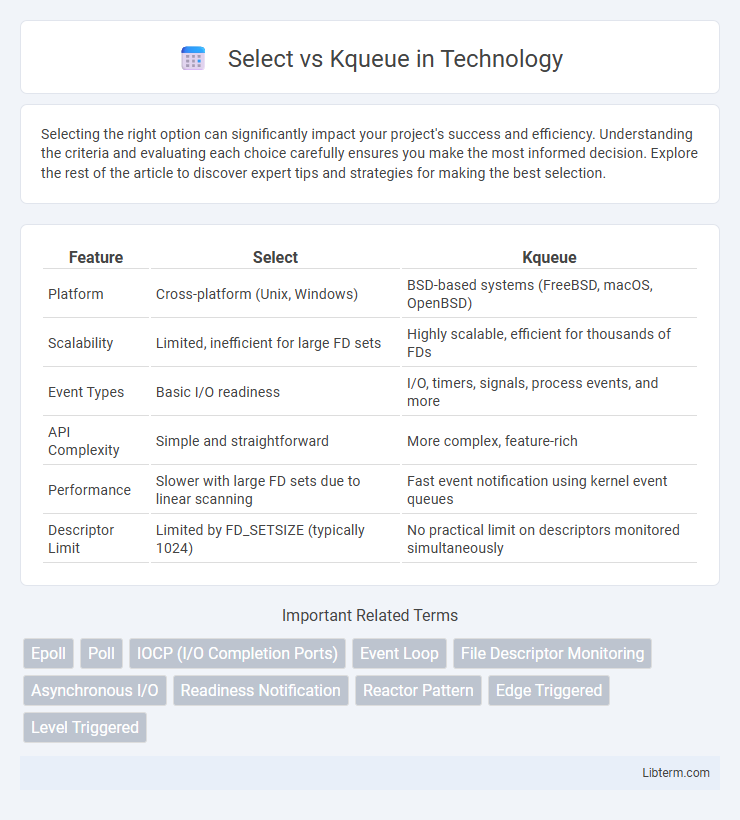Selecting the right option can significantly impact your project's success and efficiency. Understanding the criteria and evaluating each choice carefully ensures you make the most informed decision. Explore the rest of the article to discover expert tips and strategies for making the best selection.
Table of Comparison
| Feature | Select | Kqueue |
|---|---|---|
| Platform | Cross-platform (Unix, Windows) | BSD-based systems (FreeBSD, macOS, OpenBSD) |
| Scalability | Limited, inefficient for large FD sets | Highly scalable, efficient for thousands of FDs |
| Event Types | Basic I/O readiness | I/O, timers, signals, process events, and more |
| API Complexity | Simple and straightforward | More complex, feature-rich |
| Performance | Slower with large FD sets due to linear scanning | Fast event notification using kernel event queues |
| Descriptor Limit | Limited by FD_SETSIZE (typically 1024) | No practical limit on descriptors monitored simultaneously |
Overview of Select and Kqueue
Select and Kqueue are I/O multiplexing mechanisms used in Unix-like operating systems to monitor multiple file descriptors. Select operates by scanning descriptor sets with fixed limits, leading to scalability challenges under high loads, while Kqueue leverages an efficient event notification system optimized for large numbers of descriptors, reducing overhead and improving performance. Kqueue is primarily available on BSD-based systems, whereas Select enjoys broader compatibility across various Unix platforms.
Core Concepts and Mechanisms
Select and kqueue are event notification mechanisms used in operating systems for monitoring multiple file descriptors to see if I/O operations can be performed. Select uses a fixed-size bitmask to track file descriptors, which limits scalability and incurs overhead when managing large descriptor sets, whereas kqueue employs a more efficient event-driven model with kernel-level event queues that support edge-triggered notifications and scalable handling of thousands of descriptors. Kqueue's design reduces the need to repeatedly scan descriptor sets, enabling higher performance in applications requiring extensive I/O multiplexing compared to the more traditional select system call.
Platform Compatibility
Select is widely supported across many operating systems, including Windows, Linux, and macOS, making it a versatile choice for cross-platform applications. Kqueue is specifically designed for BSD-based systems such as FreeBSD, OpenBSD, and macOS, providing efficient event notification but limited platform compatibility outside these environments. Developers targeting broad platform support often prefer Select, while those optimizing for BSD systems benefit from Kqueue's scalable event handling features.
Performance Comparison
Kqueue offers superior performance over Select by efficiently handling large numbers of file descriptors through an event-driven notification mechanism, reducing CPU usage and system calls. Select suffers from scalability issues due to its O(n) complexity in scanning file descriptor sets, making it less suitable for high-concurrency environments. Benchmarks consistently show kqueue's lower latency and higher throughput in network applications on BSD-based systems.
Scalability Considerations
Select has limited scalability due to its fixed-size file descriptor set, typically capped at 1024 descriptors, which restricts handling large numbers of simultaneous connections. Kqueue, designed for BSD systems, offers superior scalability by using event notification mechanisms that efficiently monitor thousands of file descriptors without performance degradation. The kernel-level architecture of kqueue reduces user-space overhead, making it suitable for high-concurrency applications requiring low-latency event processing.
Resource Consumption
Select and Kqueue differ significantly in resource consumption, with Kqueue offering more efficient scalability for handling large numbers of file descriptors. Select uses a fixed-size bitmask, which leads to higher CPU and memory usage as the number of descriptors grows, causing performance bottlenecks. Kqueue operates with event-driven notifications, minimizing resource overhead and improving system responsiveness in high-load environments.
Event Notification Methods
Select and Kqueue are event notification methods used in I/O multiplexing to monitor multiple file descriptors for readiness. Select uses a fixed-size bitmask and has limitations on the maximum number of descriptors, leading to inefficiencies in scalability. Kqueue employs a more efficient event-driven mechanism with kernel-level event notifications, supporting dynamic event filters and enabling high-performance handling of large-scale concurrent connections.
Use Cases and Applications
Select is more suitable for applications requiring compatibility across multiple operating systems, such as simple network servers and cross-platform tools. Kqueue excels in high-performance, event-driven scenarios on BSD-based systems, notably in web servers, real-time messaging, and file system monitoring. Kqueue's scalability and efficiency make it ideal for handling large numbers of simultaneous connections, while Select remains useful for lightweight, less demanding socket management tasks.
Limitations and Drawbacks
Select has significant limitations in scalability due to its fixed maximum file descriptor limit (typically 1024) and the need to scan the entire descriptor set, resulting in high CPU overhead for large numbers of file descriptors. Kqueue, while more efficient and scalable on BSD-derived systems, is limited by its platform dependency, lacking native support on non-BSD operating systems like Linux. Both mechanisms can struggle with complex event handling scenarios, but kqueue offers better performance and lower latency for high-concurrency applications.
Choosing Between Select and Kqueue
Choosing between Select and Kqueue depends on the operating system and scalability requirements; Select is widely supported across UNIX-like systems but suffers from limited file descriptor scalability and inefficient handling of large numbers of sockets. Kqueue, specific to FreeBSD and macOS, offers efficient event notification, lower CPU usage, and better performance for applications managing thousands of concurrent connections. Developers targeting high-performance network servers on compatible platforms should prefer Kqueue for its advanced scalability and precise event filtering capabilities.
Select Infographic

 libterm.com
libterm.com